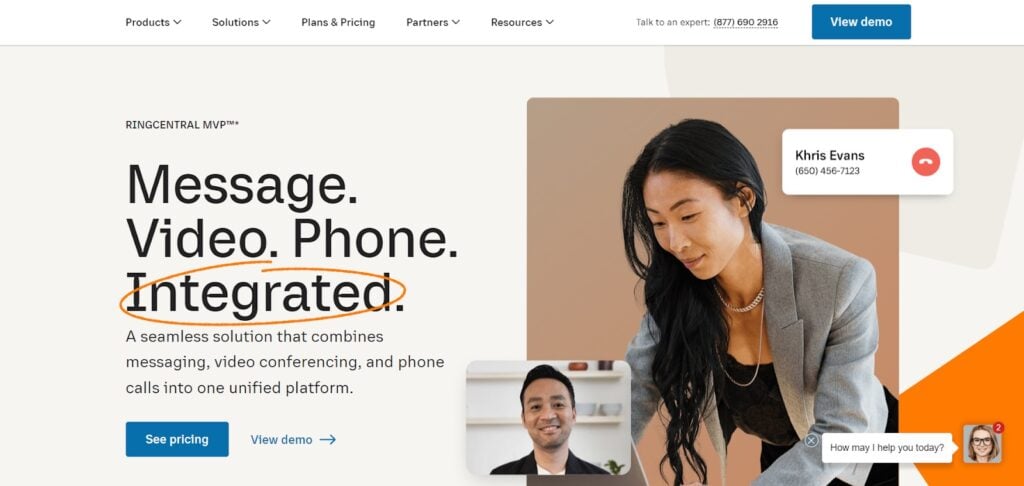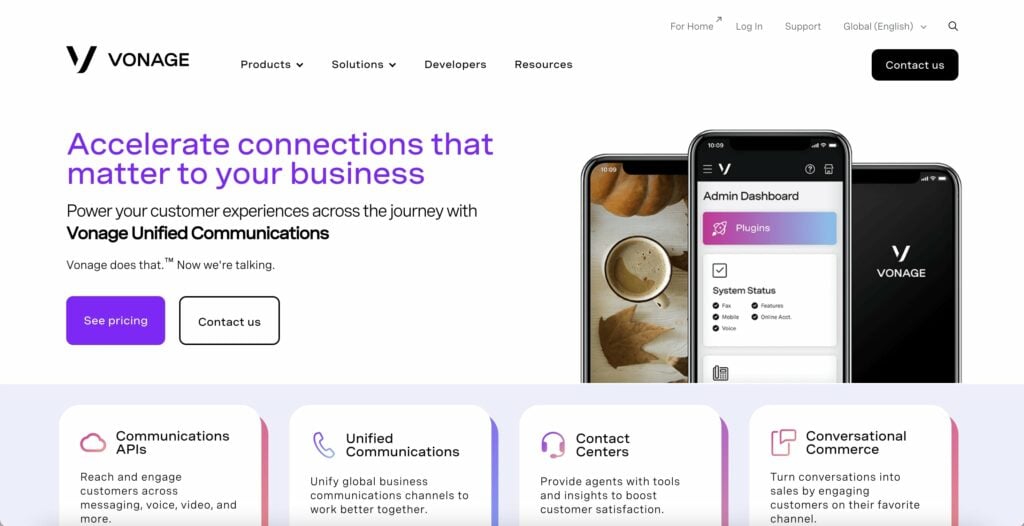Are you looking to optimize your business’s productivity and efficiency? VoIP phone systems are a great way to do just that. They offer the same features as traditional phones but with more flexibility and cost-effectiveness. With so many options, it can be difficult to choose the right one for your needs.
In this blog post, we’ll explore what VoIP phones are, their advantages and disadvantages, how to select a provider that meets your requirements, and much more! We will also provide helpful tips on setting up a system to maximize its benefits while troubleshooting any potential issues along the way. So if you’re ready for an efficient solution tailored specifically for businesses like yours – let’s get started!
What is VoIP Phone?
A VoIP phone is a type of telephone that uses Voice over Internet Protocol (VoIP) technology to convert calls into digital signals and send them over the internet. This allows users to make and receive calls from any device with an internet connection, including laptops, desktops, physical phones, tablets, or mobile phones.
VoIP phones offer several advantages compared to traditional landline services, such as lower costs, greater mobility, and flexibility in area codes. They are also easier to set up than landlines since they don’t require complex wiring systems. Businesses large and small can benefit from using VoIP phones for their customer service teams or conference rooms as it will save them money while providing more features than traditional landline services.
Definition of VoIP Phone
A VoIP phone is a telephone device that uses Voice over Internet Protocol (VoIP) technology for making and receiving voice calls through the internet instead of traditional landlines or cellular networks. This type of phone system can be used in residential and business settings. It offers many advantages compared to traditional telephone systems, such as cost savings, flexibility, mobility, enhanced features, and functionality.
Benefits of VoIP Phone
The primary benefit of using a VoIP phone system is cost savings since there’s no need for expensive hardware or long-distance calling fees. Additionally, businesses can enjoy greater flexibility when scaling their operations up or down without investing in additional equipment or services.
With a VoIP system, businesses also have access to remote workers who can take advantage of mobility options like softphones and mobile apps for making calls on the go without incurring extra costs associated with roaming charges on cell phones. Finally, advanced features like call forwarding/routing capabilities allow businesses more control over how they manage incoming calls while providing customers with better overall service experiences.
How Does a VoIP Phone Work
VoIP phones work by converting analog voice signals into digital signals over your broadband internet connection. This means that instead of using a traditional landline, VoIP phones use the internet to make and receive calls. All you need is an internet service, a VoIP-compatible phone, and a VoIP service provider to place and connect the calls.
To set up your VoIP system, you’ll first need to plug in your compatible phone or device. Then have your tech team configure the system to best suit your particular needs. Depending on what type of telephone device you choose for your business, it can be connected easily with just one cable or wirelessly via Wi-Fi or Bluetooth technology.
The great thing about modern VoIP systems is that they come with many features such as caller ID display, call forwarding, voicemail options (including text transcriptions), video conferencing capabilities, and more! With these features available at no extra cost compared to traditional landline services – it’s easy to see why so many businesses are making the switch from their old PBX systems to cloud-based solutions like SaaS providers offer today.
For those companies who already have significant investments in PBX systems but want access to all the benefits of cloud-based phone services – there’s still hope! Many providers now offer something called SIP trunks which allows users to connect their existing PBX system directly to their new VoIP network without having any additional hardware installed at all!
Overall switching from traditional landlines services over to modern-day cloud-based solutions has never been easier thanks largely due advancements made within the industry when it comes specifically to VoIP technologies allowing for businesses both large & small alike to take advantage of this innovative technology & its various features benefits whilst saving money along the way too – ultimately helping them optimize productivity & efficiency throughout their organization overall!
Key Takeaway: VoIP phones offer businesses cost savings, flexibility, mobility, and advanced features like call forwarding routing capabilities. Key benefits include: – Cost Savings – Flexibility & Scalability – Mobility Options (Softphones & Mobile Apps) – Advanced Features (Call Forwarding and Routing)
Advantages of Using a VoIP Phone System
VoIP phone systems offer a range of advantages for businesses, from cost savings to enhanced features and functionality.
Cost Savings
VoIP phone systems are often much more affordable than traditional landline solutions. With VoIP, you can save money on monthly bills and long-distance charges. You also don’t need to purchase additional hardware or software to use the system, reducing costs.
Flexibility and Scalability
VoIP is highly flexible and scalable, allowing you to easily add new users or lines when needed without having to invest in expensive equipment upgrades. It also makes it easy for employees who work remotely or frequently travel since they can access their business line from anywhere with an internet connection.
Mobility and Remote Accessibility
With a VoIP system, your employees can make calls from any device with an internet connection, such as laptops, tablets, smartphones, etc., making them more accessible even when away from the office. This allows your team members to stay connected no matter where they are located while maintaining professional communication standards with customers and colleagues.
The advantages of using a VoIP phone system make it an attractive option for businesses looking to save money, increase flexibility and scalability, and access enhanced features. However, some potential drawbacks should be considered before investing in this technology.
Key Takeaway: VoIP phone systems offer businesses cost savings, flexibility, scalability and mobility with remote accessibility. Employees can make calls from any device with an internet connection such as laptops, tablets and smartphones.
Disadvantages of Using a VoIP Phone System
Quality issues, security concerns, and dependence on an internet connection can all be potential problems when using VoIP phones.
Quality Issues
Poor quality calls are one of the most common disadvantages associated with VoIP phone systems. The quality of a call is determined by the speed and reliability of your internet connection. If you have a slow or unreliable connection, then it could lead to poor sound quality or even dropped calls. To ensure good call quality, you should invest in high-speed broadband with low latency and jitter levels.
Security Concerns
Security is another major concern regarding VoIP phones as they rely on the same network as other devices connected to your business’s Wi-Fi network, such as computers and laptops. Any malicious activity on these devices can affect your VoIP system, too, if not properly secured with firewalls and antivirus software installed across all devices connected to the network.
Although there are some disadvantages to using a VoIP phone system, it can still be an effective and cost-efficient communication tool for businesses. Choosing the right provider is key to ensuring you get the most out of your VoIP phone system.
Key Takeaway: VoIP phones offer businesses a range of advantages, but quality issues, security concerns, and reliance on an internet connection must be taken into account: – Invest in high-speed broadband with low latency and jitter levels. – Ensure your network is secured with firewalls and antivirus software across all devices.
Should You Make a Switch to VoIP?
VoIP (Voice over Internet Protocol) is quickly becoming the go-to communication system for businesses of all sizes. It offers a range of features and benefits that traditional telephony systems simply can’t match.
For starters, VoIP allows you to make calls from any device with an internet connection – no need for expensive hardware or complicated wiring. You also get access to advanced features like call forwarding, voicemail transcription, and video conferencing at a fraction of the cost of legacy systems.
Plus, VoIP services are incredibly scalable – they can easily grow as your business does without needing additional equipment or installation costs. And because it’s cloud-based, you don’t have to worry about maintenance or downtime either!
But perhaps the biggest benefit of switching to VoIP is its reliability and security. With encryption protocols in place, your conversations will remain secure even if someone tries to eavesdrop on them. Plus, since VoIP runs on IP networks instead of copper wires like traditional phone lines do, it won’t be affected by power outages or weather conditions – so you’ll never miss an important call again!
So why wait? Make the switch today and start taking advantage of all these amazing benefits right away!
Overview of Best VoIP Providers
There are many different VoIP providers available on the market today. To help you find the right one for your business needs, we’ve compiled a list of some of the top-rated VoIP services.
RingCentral

RingCentral is one of the most popular VoIP providers out there. They offer a wide range of features including unlimited calling plans, video conferencing capabilities, and cloud storage solutions. Plus they have excellent customer service support so you can get help quickly if needed.
Nextiva

Nextiva is another great option when it comes to VoIP services. They offer competitive pricing plans as well as advanced features like call forwarding and voicemail transcription capabilities. Plus their customer service team is highly rated so you know any issues will be taken care of quickly and efficiently.
Grasshopper

Grasshopper offers an easy-to-use interface that makes setting up your account simple and straightforward – perfect for those who aren’t tech-savvy or don’t want to spend time learning how to use complicated software programs! Additionally, they provide helpful resources such as tutorials on how to set up certain features in order to get started using their system quickly and easily without any hassle or confusion.
Vonage

Finally, Vonage Business Solutions offers powerful tools such as HD video meetings along with advanced analytics reports which allow managers & executives alike to gain insights into employee performance & productivity levels while helping them identify areas where improvements can be made within their organization’s workflow processes – all from one centralized platform!
Not only do they provide these useful tools but also boast 24/7 customer support should any technical difficulties arise during usage periods too!
Choosing the Right VoIP Provider for Your Business Needs
When it comes to choosing the right VoIP provider for your business needs, there are a few key considerations that you should take into account.
Research Different Providers and Plans
The first step is to research different providers and plans available on the market. Look at features such as call quality, scalability, customer service, pricing structure, and more. Make sure to read reviews from other customers before making a decision. This will help you narrow down your options and decide which provider best suits your needs.
Consider Your Current Infrastructure
Before selecting a VoIP provider, consider what infrastructure you currently have or need to set up for the system to work properly. You may need additional hardware or software depending on your type of VoIP phone system. It’s important to factor this cost into your budget when researching different providers so that you can accurately compare their offerings against one another.
Know Your Requirements
Every business has unique requirements for communication systems like VoIP phone systems – understanding these requirements is essential to select the most suitable option for your organization’s needs. Consider factors such as how many users will be using the system simultaneously; whether mobile access is necessary; what kind of customer support they offer; etc., so you can find a solution that meets all of those criteria without breaking the bank.
When it comes to VoIP providers, there are many options available for businesses. To ensure you make the best choice for your needs, it is essential to research different plans and understand your current infrastructure. Now that you have made an informed decision on which provider to go with, let’s look at how to set up a VoIP phone system for your business.
Setting Up a VoIP Phone System for Your Business
Setting up a VoIP phone system for your business can be a great way to save money and improve communication. Understanding the necessary equipment, network settings, and testing procedures is important before going live with your new system.
Gather Necessary Equipment and Supplies
Before setting up your VoIP phone system, ensure you have all of the necessary equipment. This includes phones, headsets, routers, modems, cables, power supplies and any other accessories that may be required for installation. You’ll also need to purchase a subscription plan from an internet service provider (ISP) to access their services.
Configure Network Settings
Once you’ve gathered all of the necessary equipment and supplies for your VoIP phone system setup process is, configure the network settings correctly so that it works properly with your ISP’s services. This involves setting up IP addresses for each device connected to the network and ensuring that port forwarding is enabled if needed by certain applications or features such as video conferencing or voice mail systems. Additionally, firewall rules should be configured appropriately to ensure security while using these services over public networks like Wi-Fi hotspots or cellular data connections.
Testing
After configuring all the necessary settings, testing everything before going live with your new VoIP phone system setup process is essential. Make sure that calls can connect without any issues between different devices on different networks, and check audio quality levels when speaking through them. This will help identify potential problems early on so they can be fixed quickly before users start experiencing them during actual usage scenarios later down the line.
Setting up a VoIP phone system can be a daunting task, but with the right information and preparation, it doesn’t have to be. Now that you’ve got the basics, let’s move on to troubleshooting common issues with your VoIP phone system.
Key Takeaway: Before setting up a VoIP phone system, it is important to gather the necessary equipment and supplies, configure network settings correctly, and test out everything before going live. Necessary items include phones, headsets, routers, modems, cables, and power supplies.
Troubleshooting Common Issues with a VoIP Phone System
Troubleshooting Common Issues with a VoIP Phone System is essential for businesses that rely on this technology to communicate. VoIP (Voice over Internet Protocol) phone systems are becoming increasingly popular due to their cost savings, flexibility, and scalability compared to traditional landline systems. However, there can be some issues when using these systems that need to be addressed to ensure optimal performance.
Poor Call Quality
Poor call quality is one of the most common problems associated with VoIP phone systems. This can occur due to inadequate bandwidth or network congestion caused by too many devices connected simultaneously. To resolve this issue, it’s essential to check your internet connection speed and make sure you have enough bandwidth available for all users on the system. Additionally, it would be best if you considered investing in a higher-quality router or modem to improve your connection speeds and reduce latency issues that could affect call quality.
Network Congestion
Network congestion occurs when too many devices are connected simultaneously and competing for resources from the same server or router. This can cause delays in data transmission, leading to poor audio quality during calls and dropped connections altogether. To avoid this problem, businesses must limit the number of simultaneous connections they allow on their network so as not to overload it with traffic from multiple users trying to access services simultaneously, such as streaming video or downloading large files while making calls simultaneously.
The best way to address this problem is by upgrading your current internet plan to have a sufficient amount of dedicated upload/download speeds available specifically for your company’s communications needs.
Properly troubleshooting common issues with a VoIP phone system can help ensure that your business is utilizing the full potential of its communications capabilities. In the next section, we will look at how to maximize the benefits of your VoIP phone system.
Key Takeaway: VoIP phone systems can be subject to poor call quality and network congestion, so businesses should ensure they have adequate bandwidth and limit the number of simultaneous connections on their network. Upgrade your internet plan for sufficient dedicated speeds and invest in a higher-quality router or modem if necessary.
Maximizing the Benefits of Your VoIP Phone System
Utilizing advanced features can help you get the most out of your VoIP phone system.
Advanced features such as call forwarding, voicemail-to-email integration, auto attendant, and IVR (interactive voice response) can all be used to streamline communication processes within your business.
Call Forwarding
Call forwarding allows incoming calls from one number to be routed through multiple numbers or devices so that customers always have access to someone who can answer their questions or address their concerns.
Voicemail to email
Voicemail-to-email integration ensures that messages left on an employee’s voicemail will be sent directly to their email inbox for easy retrieval and follow-up. Auto attendants allow customers who call your business line to quickly find the information they need without having a live person answer each call; this saves time and money while still providing excellent customer service.
IVR
Lastly, IVR technology allows customers with simple inquiries or requests (such as account balance checks) to make those requests over the phone using prerecorded menus instead of speaking with a live representative; this helps reduce wait times for other customers calling in with more complex issues or needs.
Monitoring performance regularly is also key to maximizing the benefits of your VoIP phone system. Regularly checking metrics such as uptime percentage, average hold time per caller, and total minutes spent on calls can help you identify areas where improvements may need to be made for your team members to provide better customer service experiences via telephone conversations or video conferencing sessions. Additionally, monitoring these metrics will give insight into which employees are excelling at providing exceptional customer service over the phone so that recognition can be given accordingly.
Key Takeaway: VoIP phone systems offer businesses a variety of features such as call forwarding, voicemail-to-email integration, auto attendant, and IVR that can help streamline communication processes. Monitoring performance metrics such as uptime percentage and average hold time per caller is also important for maximizing the benefits of your VoIP system.
FAQs concerning What is VoIP Phone
VoIP phones offer many advantages, such as lower cost, portability, scalability, and flexibility. They also provide features like call forwarding, voicemail-to-email integration, and conference calling capabilities. With VoIP phones, businesses can save money on long-distance calls while still maintaining quality audio communication with customers or colleagues worldwide.
Yes, you can use a VoIP phone as a regular phone. It works by connecting to the internet and using Voice over Internet Protocol (VoIP) technology to make calls. This type of service is often cheaper than traditional landline services, offers more features such as call forwarding and voicemail, and allows users to make international calls at no extra cost. Additionally, many VoIP phones are compatible with existing hardware like headsets or conference systems for added convenience.
Depending on the provider, it can be used with landlines and cell phones. VoIP services are typically cheaper than traditional landline or cellular plans, offer more features, and allow users to make international calls without additional fees. Additionally, many VoIP providers offer mobile apps for smartphones so users can access their accounts from anywhere in the world.
Cell phones use cellular networks to transmit voice and data, while VoIP (Voice over Internet Protocol) uses the internet for communication. Cell phone calls are usually more reliable than VoIP as they don’t require an active internet connection. However, cell phone calls can be expensive compared to VoIP, which is often free or much cheaper. With VoIP, you also have access to features such as video conferencing and call forwarding that isn’t available with cell phones. Additionally, VoIP typically offers better sound quality than a traditional landline or cell phone call due to its digital nature.
Conclusion
With the right provider and setup, you can maximize these benefits and ensure your business runs as efficiently as possible. Whether you’re just starting out or looking to upgrade your existing system, VoIP phones are an excellent choice for any business. Don’t forget to research providers thoroughly before making a decision – with the right VoIP phone system in place, you’ll be well on your way to increased productivity and efficiency!
Are you looking for the right VoIP phone solution to help your business increase productivity and efficiency? Look no further! Our website provides comprehensive reviews, comparisons, and tutorials on all top VoIP phones available. We make it easy to find the perfect product that meets your needs. With our help, you can start taking advantage of this amazing technology today!





